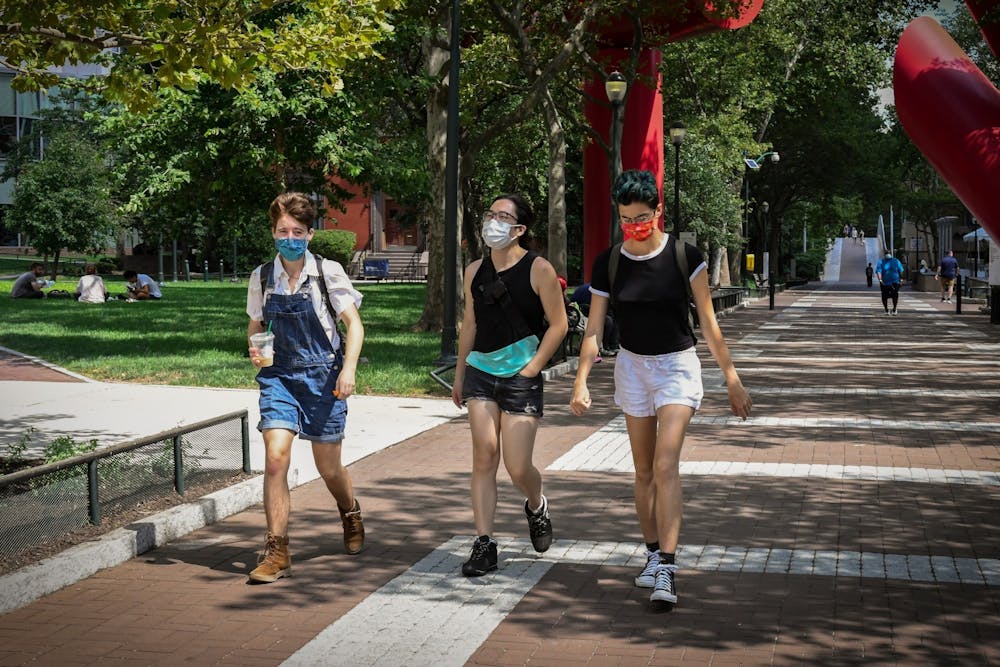
The past 15 months have undoubtedly been one of the most trying periods of our lives. Within the Penn community, we have endured isolation, continued racial injustice, and an exacerbated mental health crisis. But as the pandemic finally subsides now, and Penn realizes our hopes of a normal fall, many of us have a common question: Will things get better?
It isn’t clear that they will. Many of us remain entrapped in our pandemic-era lifestyles, and because we’re so busy this summer, we mindlessly continue performing all the “pandemic habits” that we formed without taking a moment to step back and reflect. “This summer I’m involved in research, serving as a VP for [the Transfer Student Organization], studying for the MCAT, summer courses, and volunteering,” says Rebecca Nadler, a rising College junior. “I honestly feel just as engaged as I was during the school year.” As pre-pandemic normalcy returns, we should set aside some time this summer to reflect on how COVID-19 changed our lifestyles, and then use this knowledge to construct better post-pandemic ones.
During the pandemic, social distancing restrictions forced us to discover new ways to sustain our well-being. With gyms closed, habits such as daily walks, at-home yoga, and indoor workouts became popular. Rather than doing away with these good, healthy habits, we should recycle them, implementing them in our post-pandemic lives to a suitable extent. For example, instead of dropping daily walks altogether, we can go on walks, but perhaps only on more notable occasions — e.g. after making a stressful deadline of the week.
Self-care also gained spotlight during the pandemic, with nearly seven in 10 Americans reporting a higher priority of it in 2020. If you started meditating, reading, or exercising during the pandemic, make an effort to continue doing so because such self-care practices can be crucial to preventing burn-out, anxiety, depression, and resentment. Finally, during the pandemic, many of us found novel ways to remain connected over long distances, which was significant because social connection has a strong, positive impact on physical and mental well-being. As socializing restrictions continue to lift, we should push ourselves to physically reconnect with each other, while also making sure to remain virtually connected with those of our loved ones who are long distance.
Unfortunately, just as the pandemic helped us improve our lifestyles in some ways, it also worsened them in others, with many of us picking up bad habits during the pandemic as a result of the newfound stress. On average, we started drinking more, spending more time behind screens, skipping physical activity, and more. If you feel like you developed a habit that’s inescapable, know that you’re not alone. Although breaking bad habits can be challenging, know that it is still achievable. A good starting point is the realization that you are in full control — the only person who controls whether a bad habit is carried out is your own self. After we repossess responsibility, there are certain steps that we can take to overcome any bad habit.
In his international bestseller book, Atomic Habits, author James Clear explains the four steps to break any bad habit. First, remove cues that trigger the habit. For example, if you are trying to cut alcohol, throw away your booze and pack away all your wine glasses. Second, highlight the benefits of avoiding your bad habits. If you are trying to regain the motivation to exercise, compile a list of all the long-term health benefits of physical activity and use it to remind you of why you're doing it in the first place. Third, increase the number of steps needed to perform the bad habit (i.e., create more friction). For instance, if you are trying to cut screen time, leave your phone in another room for a few hours and resist the urge to quickly glance. Lastly, make your bad habits costly. Having an accountability partner — like a friend or family member — check you whenever you perform a bad habit can be helpful. Of course, breaking bad habits can’t be done alone. If you need help realizing that control, there are resources out there to help you, both from Penn (such as Counseling and Psychological Services, the Weingarten Center, etc.) and from your loved ones.
So, will things get better? Yes. One silver lining of the pandemic is that it has underscored all of our formidable armaments of resilience and perseverance. Let’s make the most out of this summer by reflecting on the past and adapting for the future. That way, when we all return for a finally normal fall semester in a few months, we can do so better prepared than any year before.
ASAAD MANZAR is a College senior from Dallas, TX studying Neuroscience. His email is asaad01@sas.upenn.edu.
The Daily Pennsylvanian is an independent, student-run newspaper. Please consider making a donation to support the coverage that shapes the University. Your generosity ensures a future of strong journalism at Penn.
Donate







